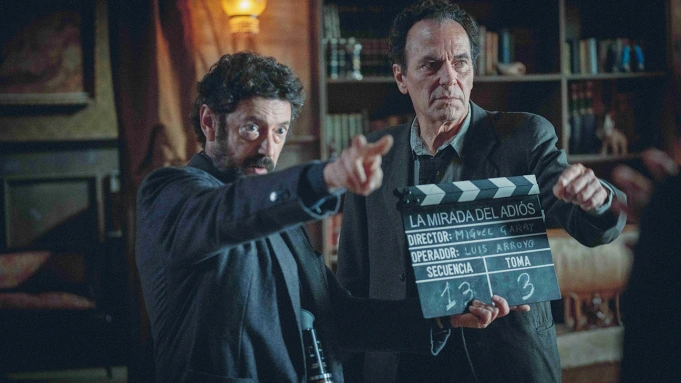 Victor Erice's "Close Your Eyes"
Victor Erice's "Close Your Eyes"
The last few days of the Cannes Film Festival have been a whirlwind. The titles premiering out of the main competition have given audiences reason to talk. Why on earth would Thierry Frémaux doom them to less prestigious sections? Victor Érice's grand return to feature filmmaking after a 30 years absence is the most glaring example. The director spoke out in an open letter about being blindsided by the programmer, having been persuaded to present Close Your Eyes at the Croisette under false pretenses. Less controversial is the announcement of a Fists in the Pocket English-language remake which will star Josh O'Connor, Kristen Stewart, and Elle Fanning. The director will be none other than Karim Aïnouz who is currently in competition against the original Fists in the Pocket director, Marco Bellocchio...
In other news, Aki Kaurismäki's Fallen Leaves delighted many while Jessica Hausner's Club Zero got its fair share of bad press. Still, many speculate that the latter might be right up Ruben Östlund's alley – is there a prize coming? Wes Anderson's Asteroid City proved polarizing, but that's normal for Anderson. Finally, Marco Bellocchio's Kidnapping divided opinions across continental lines with American press dismissing it and many Europeans going gaga. Will the seventh time be the charm for this festival regular who has yet to win a single award from a Cannes jury?
Today's Cannes at Home adventure features Kaurismäki's Drifting Clouds, Hausner's Lourdes, Anderson's The French Dispatch, and Bellochio's Fists in the Pocket.
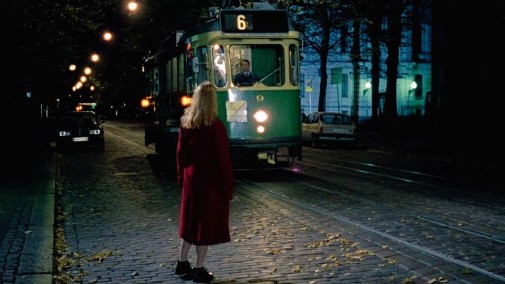
DRIFTING CLOUDS (1996) Aki Kaurismäki
The Kaurismäki deadpan is legendary, but people can overstate it, missing other elements of the director's cinema beyond its stone-faced sense of humor. Though jokes often come with an ironic twist in the Finn's films, that doesn't mean earnestness is out of the question. Indeed, I'd argue it's as significant as the dry delivery, underpinning humor with the beating heart of a true romantic. Consider the so-called Finland trilogy, each of its chapters a love story, no matter the stylistic package in which it arrives. Accept the mannerism while laughing along, and you'll grasp the devastating sincerity found within Kaurismäki's best efforts.
Drifting Clouds, the first entry in that trilogy, isn't usually counted among the auteur's major works. Still, it represents an elegant balancing act, where romance and deadpan are united in happy matrimony. Indeed, the couple at the narrative's center is married when we first meet them, so calling theirs a love story might not be correct if one presumes those are exclusively about falling in love. The spring of the relationship is unseen prologue to the main action, which considers the hardships of maintaining devotion under the financial stress of a recession. Buying a TV can cause headaches, and dreams of the future are riddled with angst.
Yet, they'll persist, and so will Kaurismäki's attentions remain loyal to their steadfastness in the face of precarity. Drifting Clouds is frank in its depiction of a struggling middle-class milieu, repudiating notions of miserabilism to pursue a sober sort of hopefulness instead. And so, there's a distance there, a stop-gap that will prevent the romanticism from spilling, from overflowing. That distance is achieved through the unique performance style the director has developed with his regular players. Mostly, though, it comes from the precise audiovisual construction that paints Helsinki in rich shades and theatrical light. If it's difficult to imagine Kaurismäki without the deadpan, it's impossible to conceive of his cinema without cinematographer Timo Salminen.
Drifting Clouds and a cadre of other Kaurismäki titles are streaming on the Criterion Channel.
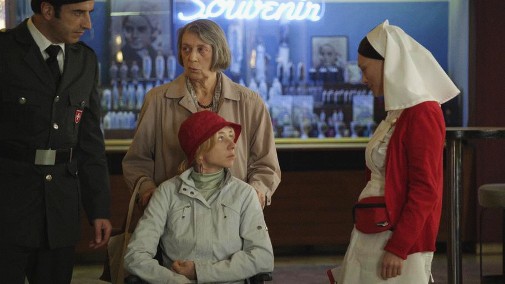
LOURDES (2009) Jessica Hausner
The cinema of Jessica Hausner is rigorous, with formal conceits building up a rigid detachment that can benefit or take away from the stories she tells. In Lourdes, it works perfectly, providing a sense of ambiguity necessary for its considerations on religion, church, commodified faith, and the various degrees of belief that separate the worthy from the unworthy. The focus is on Christine, a woman living with multiple sclerosis who finds herself on pilgrimage to the famed sanctuary in the Pyrenees. That said, her camera is far from stuck on the individual, doing much work to present a collective portrait of the pilgrims, their aids, and the commercial industries that wish to profit from them. She's one of many yearning for a miracle.
In this particular scenery, the presentational compositions and general remoteness lead to a sardonic twist. Kitschy little details like a "best pilgrim" award and the proliferation of neon signs across places of worship bring a smile to the viewer's face. That merriment is crossed with a mean streak, for Hausner's taste for human absurdities further encompasses human cruelty. Judgment is always near, though not necessarily from above. It comes laterally, born out of jealousy and doubt, self-delusion, optimism that might as well be blindness. It all builds up through canny performances and directorial control, manipulating the viewer in oblique terms until an unforgettable finale. But even then, the truth will ultimately depend on your interpretation. On your faith, whether in a higher power or in people.
Lourdes is streaming on Kanopy and Tubi.
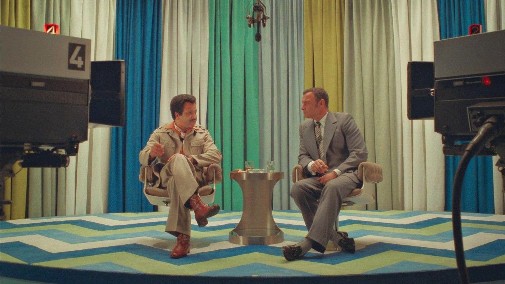
THE FRENCH DISPATCH (2021) Wes Anderson
At a certain point, I think certain critics should accept, to others and themselves, that they don't like Wes Anderson's vision of cinema and never will. His style is too particular to be everyone's cup of tea but so intense it can be a real hindrance to those who just don't gel with it. Specifically, the aesthetic often overwhelms and precludes engagement. I say this not to criticize fellow critics but to rationalize why some look at the director's rich oeuvre and declare it empty of ideas and emotion. Of course, like every artist, Wes Anderson isn't above reproach. Nevertheless, the tenor of some complaints rankles me in its refusal to grapple with the films themselves.
This was never more apparent than upon the release of the director's last feature before Asteroid City, another Cannes Main Competition title and, in its own way, Anderson's most blatant homage to the French cineastes that shaped him. The French Dispatch shapes itself around the general idea of its titular publication, sketching a new issue in the aftermath of its leader's sudden death. Pristinely put together, it's like the big-budget version of a student film eager to show off all its makers can do. Perhaps more importantly, it feels like a collection of various creatives' contributions, akin to the editorial effort at its center. It's a memorialization, a party, a wake.
It's Anderson's stubborn conviction that he shall ape Godardian invention through a Tati-like focus of form-based comedy. Referential but not stingily reverential, The French Dispatch wants to share its passions with the viewer rather than enclose itself in insular exercises. However, it can feel that way, for the picture shows no signs of compromise, going full throttle into the maximum manifestation of its ideas and ideals. Many do jump at the opportunity to mention the design and photography, though I think the editing is the key to it all, like the needed punctuation on a well-written but florid essay. Phrasings vary in scene rhythms, sharpness never dulled.
But the cutting isn't cutting, and it won't draw blood. It will, although, draw a tear here and there. Confession time: I've rarely been this moved by an Anderson picture. My defense may be a response to sentimental value, a response to the feelings the picture inspired in me. Recall the weird nostalgia of Wilson's mannered city tour, the self-destructive loves laced betwixt prison transactions, a glimmer of hesitance in Frances McDormand's face, the sorrowful miracle of Jeffrey Wright's performance. How can I passively accept that others call it empty when my heart feels so full? It doesn't make sense. Not to me, at least.
The French Dispatch is streaming on Hulu, HBO Max, and DirecTV. You can also find it on most major platforms, available to rent and purchase.
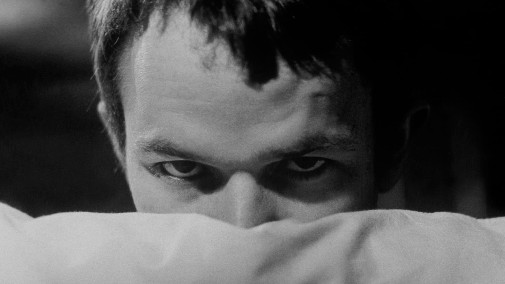
FISTS IN THE POCKET (1965) Marco Bellocchio
Admitting antipathy toward a filmmaker's conception of film isn't just something others should do. So now it's my time to come clean. Dear reader, Marco Bellocchio's cinema is seemingly not for me. Or, at the very least, his recent output. Recent means 1980 onward, for this Cannes at Home project gave me the right motivation to finally find a Bellocchio I could fall for. As it happens, that elusive title is the man's first feature, a misanthropic tragedy that skewered the Italian family and infuriated the young artist's idols. Buñuel and Antonioni hated it, and they were far from the only ones.
In a way, one can easily understand the revilement. Fists in the Pockets is the story of a dysfunctional clan, where the older son is the sole breadwinner in charge of the care of three chronically ill siblings and their blind mother. One of the brothers, Alessandro, feels angered by this state of affairs, taking on the mission of ridding the world of such leeching folk. In short, he shall murder his family, including himself, and leave only the healthy brother alive, ready to thrive without the shackles of congenital responsibility. What a nightmare this is, offering a portrait of young masculine rage that still feels provocative today, the ideology beneath the anger much less mortal than the characters who let themselves be seduced by it.
But this is not merely a matter of a great script, for young Bellocchio knew how to formalize his ideas in scenographic means, staging the actors and camera with prickly obstinance. Consider how the camera sweeps into Alessandro's face right after a matricidal crime. It's like he's floating over the landscape, free at last. The sudden cut from scream to silence, a heavenly murmur twinkling on the soundtrack, makes the horror of the action all the more perverse. Though it's impossible to contradict the man's iniquity, the film's mechanics lead us into a shared state of bliss over his plans of familial annihilation.
We are made equally culpable in his game of twisted liberation, forced to be complicit, both impossibly close and utterly alienated from him. Still, that association is as flexible as the celluloid image. Allow the director and his actors to subvert the paradigms of the story, and we'll end up on the other side of the equation, horrified at what others will inflict on the homicidal maniac. Watching Fists in the Pocket is to look directly at the black hole of a young man's hatred of himself and the world. Such is the film's shock that one can hardly conceive of the director's future. How could the man who would later direct Sweet Dreams be capable of such vinegar? What malice, what marvel!
Fists in the Pocket is currently streaming on the Criterion Channel and Kanopy.
What do you think of our European Tour from Finland to France to Italy?